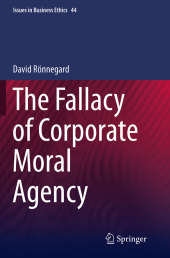 Neuerscheinungen 2016Stand: 2020-02-01 |
Schnellsuche
ISBN/Stichwort/Autor
|
Herderstraße 10
10625 Berlin
Tel.: 030 315 714 16
Fax 030 315 714 14
info@buchspektrum.de |

David Rönnegard
The Fallacy of Corporate Moral Agency
Softcover reprint of the original 1st ed. 2015. 2016. xiv, 218 S. 7 SW-Abb. 235 mm
Verlag/Jahr: SPRINGER, BERLIN; SPRINGER NETHERLANDS; SPRINGER 2016
ISBN: 9402401466 (9402401466)
Neue ISBN: 978-9402401462 (9789402401462)
Preis und Lieferzeit: Bitte klicken
It is uncontroversial that corporations are legal agents that can be held legally responsible, but can corporations also be moral agents that are morally responsible? Part one of this book explicates the most prominent theories of corporate moral agency and provides a detailed debunking of why corporate moral agency is a fallacy. This implies that talk of corporate moral responsibilities, beyond the mere metaphorical, is essentially meaningless. Part two takes the fallacy of corporate moral agency as its premise and spells out its implications. It shows how prominent normative theories within Corporate Social Responsibility, such as Stakeholder Theory and Social Contract Theory, rest on an implicit assumption of corporate moral agency. In this metaphysical respect such theories are untenable. In order to provide a more robust metaphysical foundation for corporations the book explicates the development of the corporate legal form in the US and UK, which displays how the corporation has come to have its current legal attributes. This historical evolution shows that the corporation is a legal fiction created by the state in order to serve both public and private goals. The normative implication for corporate accountability is that citizens of democratic states ought to primarily make calls for legal enactments in order to hold the corporate legal instruments accountable to their preferences.
Introduction.- Part One: The Fallacy of Corporate Moral Agency.- 1.1 The Importance of Corporate Moral Agency.-1.2 Necessary Conditions for Moral Agency.- 1.3 Corporate Intentions.- 1.3.1 Explication of Peter French´s Conception of Corporate Moral Agency.- 1.3.2 The Metaphysics of Intentions and its Moral Relevance.- 1.4 Corporate Actions.- 1.4.1 Are Corporate Agents Autonomous?.- 1.4.2 Free vs. Non-free Agents.- 1.4.3 Emergent Corporate Moral Agency?.- 1.5 Corporate Autonomy.- 1.6 Summary of why Corporate Moral Agency is a Fallacy.- 1.6.1 Autonomy.- 1.6.2 Intention.- 1.6.3 Action.- 1.7 The Reference of Corporate Proper Names and Responsibility Attributions.- 1.8 Corporate Collective Moral Agency.- 1.8.1 Joint/Shared Intentions.- 1.8.2 Group/Corporate Intentions.- 1.8.3 Corporate Collective Intentions.- 1.9 Conclusion: Legitimate and Illegitimate Corporate Moral Responsibility Attributions.- 1.9.1 Moral Responsibility Attribution to a Collective Whole.- 1.9.2 Moral Responsibility Attribution to a Corporate Structure.- 1.9.3 Moral Responsibility Attribution to a Unanimously Intending Collective.- 1.9.4 Elliptical Moral Responsibility Attribution to a Collective Whole.- Part Two: The Role of the Corporation in Society.- 2.1 The Role of the Corporation in Society: The Descriptive View.- 2.1.1 The First Corporations.- 2.1.2 The Legal Debate about the Nature of the Corporation.- 2.1.3 The Shareholder Primacy Norm.- 2.1.4 The Separation of the Corporation from the Shareholders and the Emergence of the Corporate Share as an Autonomous form of Property.- 2.1.5 The Limited Liability of Shareholders.- 2.1.6 The Reification of the Corporation (and the Legal Influence of the Theories about the Nature of the Corporation).- 2.1.7 The Corporation as Socio-economic Instrument.- 2.2 The Role of the Corporation in Society: The Prescriptive View.- 2.2.1 Ought the Corporate Legal Form to be used as an Instrument of the State?.- 2.2.2 The Wrong with the Corporate Social Responsibility Movement.- 2.2.3 The Division between Public and Private Corporate Responsibilities.- 2.2.4 Summary: The Role the Corporation Ought to Play in Society.- Conclusion.- Bibliography.


